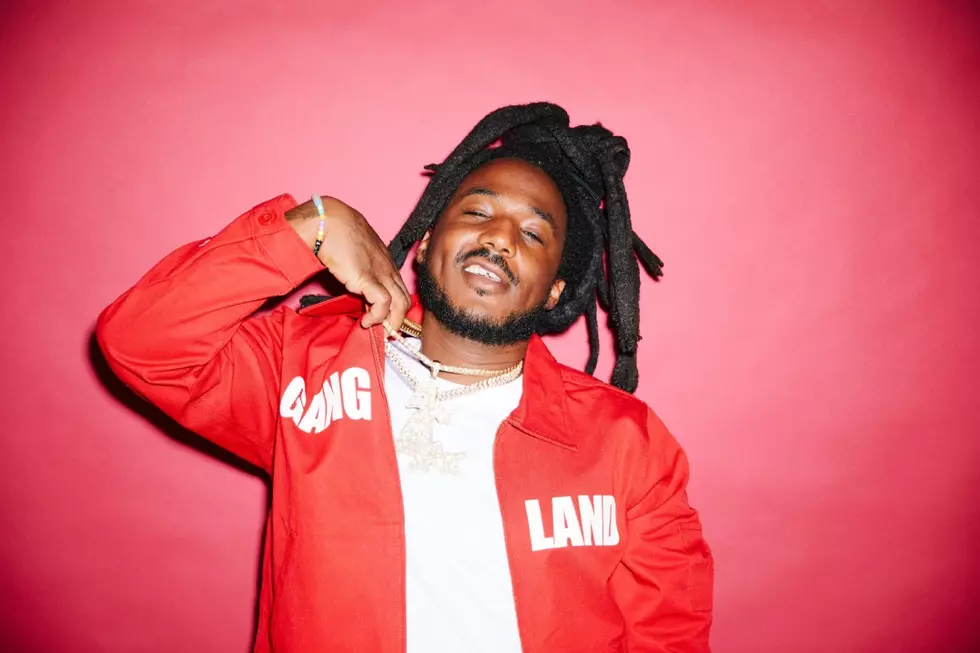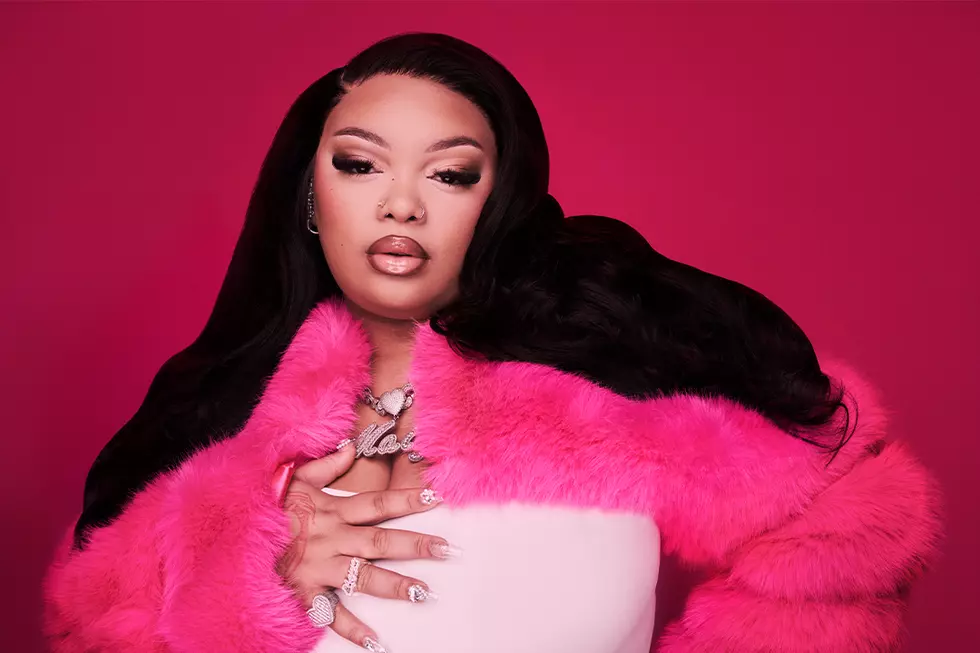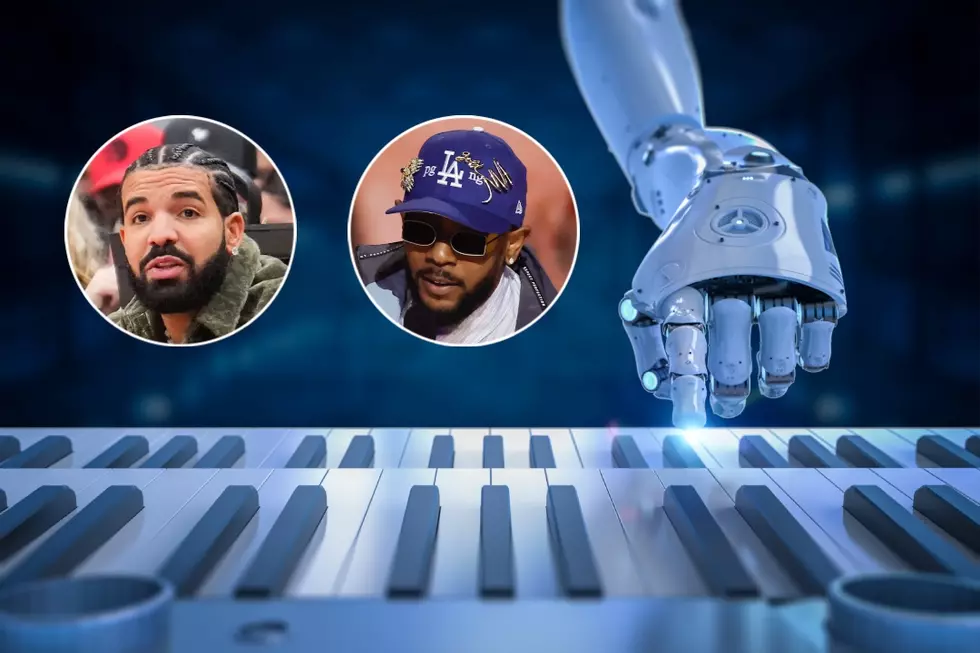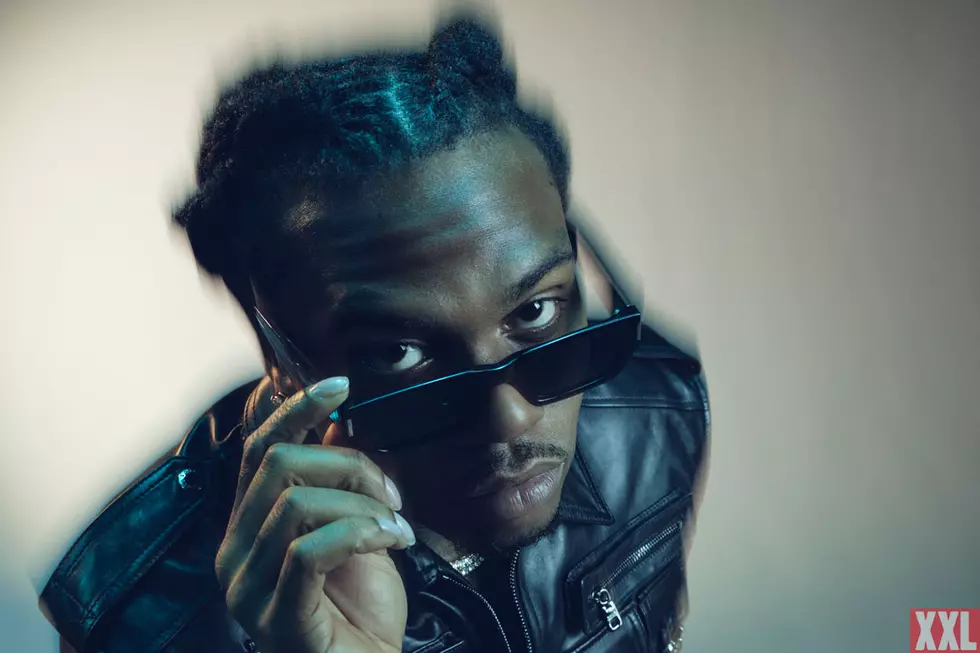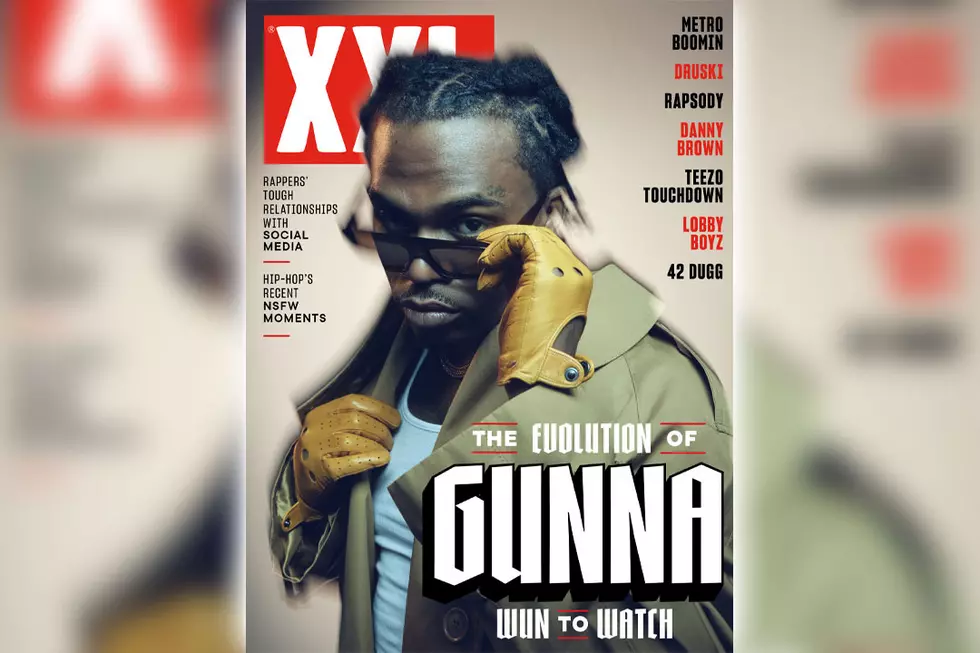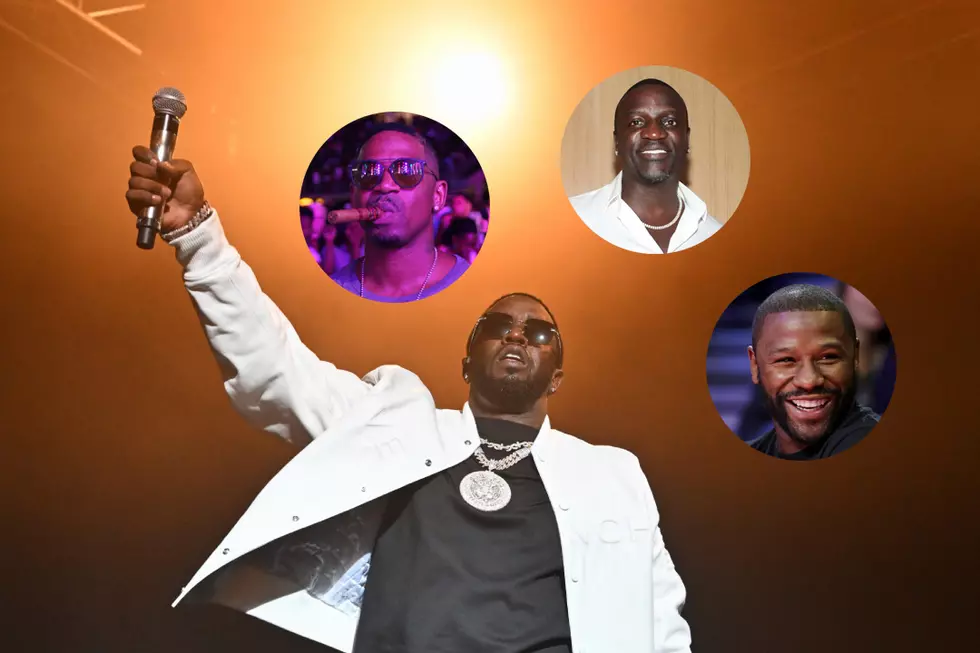
P.O.S Reflects on the Day That Changed His Life and Moving Forward With His New Album – Exclusive
“I had kind of a weird couple of years, and I feel like I’m getting into a really nice swing right now," says Stefon Alexander, better known to the rap-listening world as P.O.S. The Minneapolis native is understating things a bit here. P.O.S, famous for his work with the DIY collective Doomtree and for his own brash, heady solo records, is in the midst of a comeback that makes label disputes or stalled singles seem quaint.
March 7 was the second anniversary of the successful kidney transplant that finally addressed ailments that had been plaguing P.O.S, 34, for much of his adult life. It was also the day he dropped “Sleepdrone/Superposition,” a nine-minute single that features Allan Kingdom, Astronautalis, Eric Mayson, Kathleen Hanna, Lydia Liza, Lizzo, Nicholas L. Perez and Hard_R, the latter being his teenaged son. It’s an expansive song; the lens zooms out (Eric Garner, Mike Brown) and in (the thank you notes for friends and fans that felt hollow, cliche-riddled).
“Sleepdrone” is the first peek at Stef’s fifth album. Still untitled -- but due out some time this year -- it will be his first solo effort since 2012’s We Don’t Even Live Here. The latter LP was lean, political and predictive of where mainstream rap would intersect with electronic and dance music over the next few years, but stalled commercially when a planned national tour in its support had to be cancelled due to the rapper’s failing health.
But that hasn't stopped his momentum. “I love doing this,” he says.” I am a lifetime musician, this is what I want to do, this is what I’ve been doing since I knew I could do it. I haven’t worked a day job in well over 10 years.”
XXL spoke to P.O.S by phone about surviving the past few years and what fans can expect from the new album.
XXL: Take me back to 2012, when you were finishing We Don’t Even Live Here. What were your commercial expectations for it?
P.O.S: It was my first attempt -- kind of weird compared to a lot of people’s attempts -- but it was my first genuine attempt at having a record that had a couple of pop songs on it. “Fuck Your Stuff” is me doing my best Rick Ross, you know what I’m saying? It was my first time having a bona fide, legit star on a hook, with Justin [Vernon, of Bon Iver, on “How We Land”]. But I wouldn’t have sought out a star; it just happens that that’s my dude.
There was a point where I was going back and forth with Mike [Mictlan, another rapper from Doomtree], trying to figure out which one of these rappers would make the most sense to spend 50 grand on. We were contemplating getting Pusha T or somebody on “Get Down.” Mos Def came through the studio and went home with a couple of beats -- he was too busy acting, or whatever it was.
But that dude came and kicked it with me in the studio for hours, and we talked about Watch the Throne and he made my whole life dream come true [laughs]. He’s the nicest dude, he’s exactly like the dude you hope he is when you grow up listening to Black Star. Kendrick was about to blow, and we had been trying to get Kendrick on some shit, but then all the rumors started about him working with Dre and that was that. There was a lot of stuff that I was trying to do for the first time in the process of making the record.
And Mike ended up on the final version [of “Get Down”].
It made more sense. At the end, I was like, “I want this thing to be done, and I like these songs, and it would feel really silly to get someone I don’t know on this record and spend a bunch of money on this person.” It came down to the mentality that I’ve always had, which is that it would be really cool to make a song with Pusha T or Mos Def, or any of these people I think are legends or the best at it, but at the same time, it would feel really stupid if it didn’t happen naturally. Me striving toward, like, being a big rap star, has always been a constant battle with being a DIY kind of Minneapolis punk rocker who doesn’t want to compromise integrity for any reason [laughs]. It’s a constant conflict.
That record was probably six months ahead of its time, with all the electronic influences.
Yeah, but I feel like that’s what always happens with me [laughs]. That probably sounds incredibly, incredibly egotistical, but that’s what everybody has always said about every record I’ve ever put it out: “whoa, that was six months early man,” you know?
And you had a national tour in the works to support that record?
Planned, booked, tickets were on sale, tickets were selling -- quickly. Basically, I had known for a long time that I had kidney problems; I took a daily medicine that was supposed to stave it off. I developed an allergy to that medicine, stopped taking it, lived my touring, rap guy life and went back in for a checkup. I’d got the tour booked, gotten everything ready. We had all the shows lined up, tickets on sale and I went in for a last checkup, and my kidney doctor was basically like, “Holy shit, your kidney function is like 7 percent, you need to stop everything you’re doing right now and start dialysis.” That’s what I did.
I still managed to go do shit: Marijuana Deathsquads [an experimental electronic/noise group from Minneapolis, of which P.O.S is a member] was doing a residency in New York at the time, it was a month at the same venue. I would go out and do, not the whole month, but a week or two weeks. I’d set up my dialysis rig or whatever in a clean hotel room, turn off the moving air and all this shit. But just for a week-long trip, I was carrying a hundred pounds worth of liquids for dialysis.
I was totally down to do the whole national P.O.S tour and do dialysis on the road, but adapt it: cancel one show a week and just kind of force it to work. Pretty much everyone around me was like, “Stef, you’re an idiot.” I was still down to do it after that, but it was looking like in order to carry enough dialysis equipment, I would need an extra trailer or to take a bus and a trailer and it started looking financially impossible. And by that time I was so sick that I couldn’t do it anyway.
What was 2013 like?
I went on my first tour when I was 14, I was playing paid gigs all through high school, [touring] was what I had been doing my whole life. So this was the first time I ever took a break, you know? Since I was a teenager, it was the first time I ever stopped working, sat down and thought about my health. I tried not to destroy all my friendships; it got me incredibly depressed and crabby. After I cancelled the tour and just did dialysis. I was at home.
Were you writing at the time?
I was not writing for the dialysis time. I was really bummed out, and, I’m not 2Pac, I’m not comparing myself to 2Pac as a rapper or as a creative, because that dude wrote way more than anybody could ever write, but that dude said in an interview once that when he went to prison he couldn’t write. He said he got to prison and all his inspiration was just gone.
Usually for an artist like me, a dark point in life, or a hard, trying point in life is the kind of stuff that maybe fuels some art, and maybe makes art flow out naturally, but this particular type of suck that was going on was just not inspiring. It made everything seem really stupid--it made bragging about whatever a rapper might brag about totally, totally irrelevant. And talking about love, or the fucking government, you know, my bread-and-butter subjects, all seemed totally stupid when I was facing my own death.
And then the idea of writing songs about facing your death does not appeal to me at all, especially the way that I was writing. Maybe right now, if I was to revisit it, I could come up with something really good -- and I feel like I have, in a couple of moments of writing from the last few months -- but basically, the dialysis point was not a writing point for me.
But you’ve revisited it now?
I have a lot. Dialysis time was not writing time, but getting a kidney transplant and healing time, there was more writing. Maybe nothing I would ever put out, but a lot that I could salvage lyrics from here and there and sprinkle into other stuff -- a lot of lines that maybe give reference to how I was feeling or the places I was going mentally because of being sick. But you know, a line here or there, not song after song. I have been able to salvage some good parts from that raw emotion.
Your comeback, so to speak, was at The Fucking Best Show Ever [a one-day outdoor festival in Minneapolis curated by Greenroom Magazine, headlined by P.O.S, Busdriver, Open Mike Eagle, SZA, Le1f, Allan Kingdom, and more]. How did that come together?
That was me and Jake [Heinitz, founder and editor-in-chief of Greenroom] essentially starting our friendship. The first time we worked on something, he was throwing a festival, he wanted me to host it, we kicked it and it was cool. But then, after that, he hit me up and was like, “Hey man, do you wanna go skydiving? Because I’ve got a free skydiving trip; I figured we could split it, you’re the only person I know who might do that.” And I’d never gone skydiving before, but I was like "Yeah, fuck it." So we went skydiving and after that he was pretty much like, “Hey man, what do you wanna do now that you’re feeling better? How are you gonna come back out?” I said that I just wanted to play a cool show, and he said we should do it outside.
It was cool. I played a 45-minute set and I struggled really hard through it, but I don’t think anybody noticed I struggled really hard through it, because it was 45 minutes [laughs]. I was as live as I could be man, I was jumping, it was bananas. But yeah, that was me pretty much saying, “I’m not dead.”
In early 2015, when the new Doomtree record, All Hands, was finished, you were diving into your own stuff.
I’ve always had a good time writing [in L.A.], I have some really good friends and really close relationships out there. It’s way easier for me to focus and write when I’m away from my responsibilities at home. Being able to stay up until 2 a.m. or 3 a.m. if that’s where the song’s going, without having to turn it down for a sleeping kid. Getting away, getting your head together is good: with Doomtree records, we always usually go somewhere too, to a cabin in northern Minnesota, which I’m doing for this record now.
“Sleepdrone/Superposition” is the single and I think people were surprised you went with something so huge.
Well, I didn’t know it was going to be a single, I didn’t know it was going to be a big thing. I made the beat at my buddy Grant’s house in L.A., and I had just the main synth part, basically what you hear when the beat first starts: the synth parts, and the toms and the kick. I was basically just droning out on it, listening to it, thinking, “I could listen to this shit forever.” Just like “Drumroll” on Never Better -- that song came about because I was like, “It would be really tight to rap over a drumroll.” This time, I thought, “This part is really cool, I wanna let it play for a long time and not really change it up.” Ultimately, the longer I played it, the more I wanted to switch it up.
After I finished the beat, I realized it was going to have to be kind of a long one. As it got longer and longer, it was like, “Oh no, I need to break this up a little bit.” And I realized it would be cool to get some different voices in there -- but not even real, whole verses, more kind of like, cameos, you know what I’m saying? The way I was thinking about the song was, from the jump, it felt like it would be really tight if I had a dream sequence in the middle of the song where there are other people rapping. That’s not really what it sounds like on the [finished] song, but that’s the vibe I was going for: I’m rapping about this topic, I’m rapping about that topic, now I need a breather--and I just start daydreaming.
It feels like a solo song in a lot of respects, despite the other voices.
That’s what I was hoping for. I didn’t want it to be like, “Oh, shit, I can’t wait to hear Allan Kingdom come and just snap on this shit,” because it’s my song [laughs]. And Allan Kingdom does snap on it, everybody goes off. And I’m grateful for everybody who was involved, everybody’s got big shit going on.
You had a lot of people record for it who didn’t make the cut, right?
Tons, yeah. All kinds of people: Busdriver, Mike Eagle, Serengeti, Sophia Eris, Monty Boston., I sent it to Aesop Rock. I was like, “Get on this, just four bars!”
What’s the rest of the new album sound like?
I’m staying with the vibe that I’ve got. I like working with people who I know and love and trust their taste. I would love to be a big famous rapper, and play the game and whatever. But I’m much more content as an artist and as a musician when I know that I’m doing shit that will ultimately mean something to somebody.
The “Sleepdrone” song is a solid indication of my favorite songs on the record, but I have a few more tracks and none of them sound anything like it. It’s tricky. I made more beats on this one than I have in a minute, and the beats that I made are noisy as fuck. The beats that I picked from other people -- like Cory Grindberg and generally dudes who are influenced by the rap world, so shit that sounds more like normal rap beats -- and then I grab those and make a song on them, and try to destroy them as far as the producer will let me [laughs].
The last record I made, I went to the nicest studio I’ve ever been to in my life, considered spending money on features, and made the most polished-sounding record I’ve ever put out. The process of that -- aside from working with the amazing engineer, Andrew Dawson -- the rest of that process didn’t feel as good as, fucking, making noisy shit, because that’s the funnest shit for me to listen to. Putting out a nine-minute-long song was the most anti-pop thing that I could do, and it wasn’t necessarily on purpose, that was just the best representation of where I’m at right now.
See 40 Hip-Hop Albums Turning 20 in 2016
More From XXL


